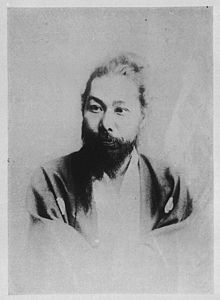Tōten Miyazaki
Tōten Miyazaki | |
|---|---|
 | |
| Born | January 23, 1871 |
| Died | December 6, 1922 (aged 51) |
| Other names | 宮崎 滔天 |
| Occupation | philosopher |
Tōten Miyazaki (Japanese: 宮崎 滔天, Hepburn: Miyazaki Tōten) or Torazō Miyazaki (1st Jan 1871– 6th Dec 1922) was a Japanese philosopher who aided and supported Sun Yat-sen during the Xinhai Revolution. While Sun was in Japan, he assisted Sun in his travels as he was wanted by Qing dynasty authorities.[1]
Biography
Tōten Miyazaki registered under the name Nakayama (中山) at the "Crane Hotel" (對鶴館). This name would later be converted to the more popular Chinese name Sun Zhongshan (孫中山).[1] While Miyazaki had the same ideals as Sun, they could not communicate by speaking, due to their different languages. They communicated by writing Classical Chinese back and forth on paper.[2]
On 7 September 1900, Sun's first overseas visit to Singapore was to rescue Miyazaki Toten who was arrested there. This act resulted in his own arrest and a ban from visiting the island for five years.
The Nanjing Historical Remains Museum of Chinese Modern History has bronze statues of Sun and Miyazaki placed alongside each other.
See also
References
- ^ a b Singtao daily. Saturday edition. Oct 23, 2010. 特別策劃 section A18. Sun Yat-sen Xinhai revolution 100th anniversary edition 民國之父.
- ^ 九州荒尾男の事 - 太陽報 (in Chinese). The-sun.on.cc. Retrieved 2011-09-26.
